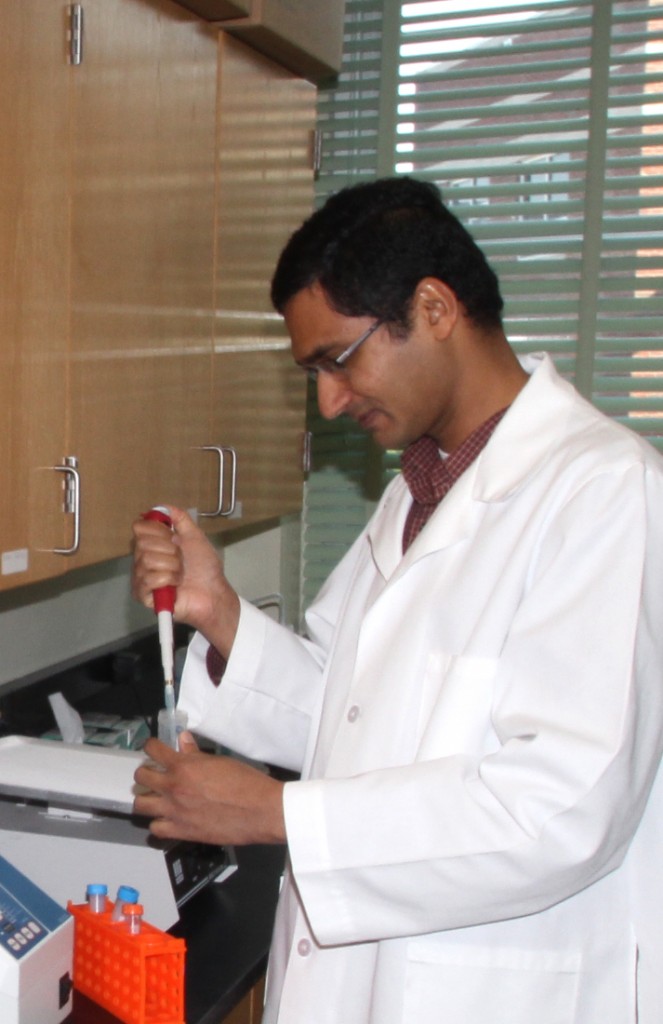
NASHVILLE, Tenn. (TSU News Service) – A Tennessee State University scientist and a group of researchers from Washington University School of Medicine at St. Louis have come up with an experimental vaccine for breast cancer that appears to be safe in a preliminary trial.
According to a study published in Clinical Cancer Research, Dr. Venkataswarup Tiriveedhi, assistant professor of Biological Sciences in the College of Agriculture, Human and Natural Sciences, and his colleagues found that the experimental vaccine, Mammaglobin-A, was “overexpressed” in 40 to 80 percent of primary breast cancers.
Also known as MAM-A, the vaccine prompted CD8 T-cells to track and eliminate the MAM-A protein, noted Tiriveedhi. To determine the efficacy and safety of the experimental drug, he said they conducted a phase I trial involving 14 patients diagnosed with advanced breast cancer.
“The side effects from the vaccine after one year were minimal, and included rashes, tenderness, and mild flu-like symptoms,” added Tiriveedhi, who specializes in cancer and immunology.
By the one-year mark, the study revealed, roughly 50 percent of the patients showed no sign of disease progression. By comparison, only 20 percent of a similar group of 12 patients showed no signs of disease progression one year out.
The researchers, however, stressed the need for a larger and longer study, to prove the current preliminary evidence prior to its use in all breast cancer patients. They theorized that “these promising results” from initial studies could be applied not only to prevent cancer progression but also to prevent the development of breast cancer in women.
“The current one (study) is a small Phase-I trial mainly aimed at testing the safety (does no harm). But we have also found this vaccine to be highly effective against the disease. The next step is to go for larger Phase II/III studies with a higher cohort of breast cancer patients and rigorously test for efficiency, dosing, clinical outcomes, cancer stage specificity, etc.,” noted Tiriveedhi, who holds MD and Ph.D. degrees.
He called the study a “promising move forward” that is not just restricted to breast cancer, but one that can be employed in “similar strategies” to treat other cancers such as lung and colon cancers.
“The MAM-A DNA vaccine is safe, capable of eliciting MAM-A–specific CD8 T-cell responses, and preliminary evidence suggests improved PF,” the researchers concluded.
Dr. Tiriveedhi, who came to Tennessee State University about a year and half ago, started the study, “Safety and Preliminary Evidence of Biologic Efficacy of a Mammaglobin-A DNA Vaccine in Patients with Stable Metastatic Breast Cancer,” with his colleagues at Washington University before leaving to join the faculty at TSU.
Tennessee State University
3500 John Merritt Boulevard
Nashville, Tennessee 37209
615.963.5331
About Tennessee State University
With more than 9,000 students, Tennessee State University is Nashville’s only public university, and is a comprehensive, urban, co-educational, land-grant university offering 42 undergraduate, 24 graduate and seven doctoral programs. TSU has earned a top 20 ranking for Historically Black Colleges and Universities according to U.S. News and World Report, and rated as one of the top universities in the country by Washington Monthly for social mobility, research and community service. Founded in 1912, Tennessee State University celebrated 100 years in Nashville during 2012. Visit the University online at tnstate.edu.
